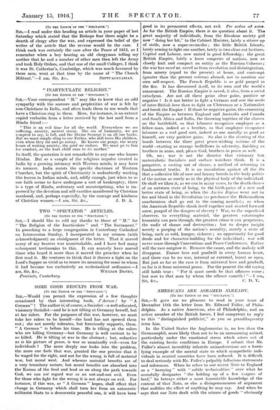SOME GOOD RESULTS FROM WAR.
[TO THE EDITOR OF THE " SPEOTATOR."I
SIR,—Would you permit the expression of a few thoughts occasioned by that interesting book, J'Accuse / by "A German" ? The author is of course, a Socialist—a well-educated, visionary Socialist—and he is not tilting at Germany herself, but at her rulers. For the purposes of this war, however, we must take her rulers to be herself—the land has not spewed them out ; she not merely tolerates, but ferociously supports, them. "A German" is before his time. He is tilting at the rulers who are killing Germany—but Germany is well content to be so killed. - He is tilting at war in the abstract ; but, seductive as is his picture of peace, is war so unmixeclly evil—even for individuals ? The more deeply one looks into the problem, the more one feels 'that war, granted the one proviso that it be waged for the right, and not for the wrong, is full of material woe, but moral weal. And whereas material benefits are of a very transitory nature, but moral benefits are absorbed into the Karma of the Soul and lead us on along the path towards God, we can not regard war as an out-and-out evil. Even for those who fight for the wrong it is not always an evil. For instance, if this war, as "A German" hopes, shall effect that change in Germany which shall turn her from an autocratic militarist State to a democratic peaceful one, it will have been good in its permanent effects, not evil. Per ardua wt astra. As for .the British Empire, there is no question about it. The great majority of individuals, from the frivolous society girl now "doing her bit," to the Cabinet Minister, lately a stirrer up of strife, now a super-reconciler ; the little British Islands, lately arming to fight one another, lately in two clear-cut factions, Capital and Labour, now united in good fellowship;' the great British Empire, lately a loose congeries of nations, now as closely knit and compact an entity as the Russian Colossus ; the war has saved us, saved us from revolution and disintegration, from misery (equal to the present) at home, and contempt (greater than the present esteem) abroad, not to mention our own self-respect. The French Republic is as gold purged in the fire. It has discovered itself, to its own and the world's amazement. The Russian Empire is saved, it also, from a social cataclysm. Are not all these gains clear gains, positive or negative ? Is it not better to fight a German and sow the seeds of inter-British love than to fight an Ulsterman or a Nationalist and break the Empire ? If those be negative gains, the cementing of the Empire as between England and Australia and Canada, and South Africa and India, the throwing together of the classes on the battlefield, so that labourer recognizes employer as a fellow-man, indeed as a brother, so that employer recognizes labourer as a real good sort, indeed as one morally as good as himself, are very positive gains. So also is the riveting of the bonds between the three great peace-wishing nations of the world—starting as strange bedfellows in adversity, finishing as brothers in arms, and, please God, brothers in peace as well.
Oh, no ; war is not the disaster that visionary but materialistic Socialists and surface watchers think. It is a purgative, a casting out of shams, a method of returning to fundamental truths. It is an inoculation against all the ills that a collective life of ease and luxury breeds in the body politic of the nation as surely as in the physical body of the individual. Or shall we liken it, as we can in many cases, to the death-throes of an outworn state of being, to the birth-pains of a new and better state of being, as when the Ancien Regime went out in fire and blood in the Revolution (as perchance the Hohenzollern anachronism shall go out in the coming months) ; as when the Americah Republic shook itself together and started forward anew, purged of the dangers of slavery ? War, to the superficial observer, to everything material, the greatest catastrophe humanity can pass through, the greatest crime it can perpetrate, the nadir of shame and destruction ; but to deeper insight merely a purging of the nation's morality, merely a state of being, such as cold, hunger, sickness ; an opportunity for good deeds and for character-building for the individual ; war will never cease through Conventions and Peace Conferences. Rather will the race outgrow it. Remove the cause, and the malady will disappear. Ensure love and goodwill in every human heart, and there can be no war, internal or external, latent or open. But just as far as the race is from universal love and goodwill, so far is it from universal peace. For the present the old saying still holds true : "For it must needs be that offences come ; but woe to that man by whom the offence cometh ! "—I ant,


































 Previous page
Previous page